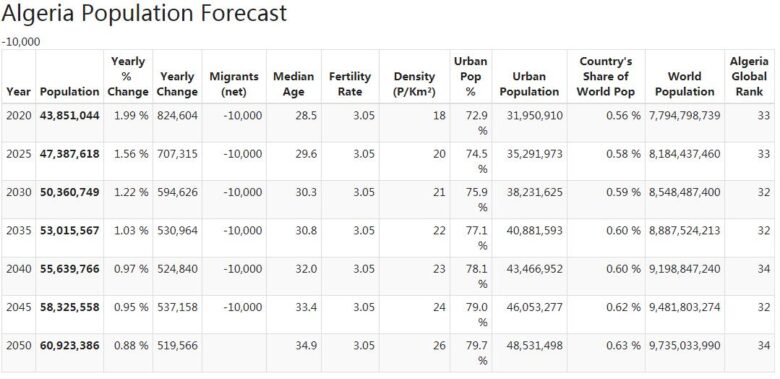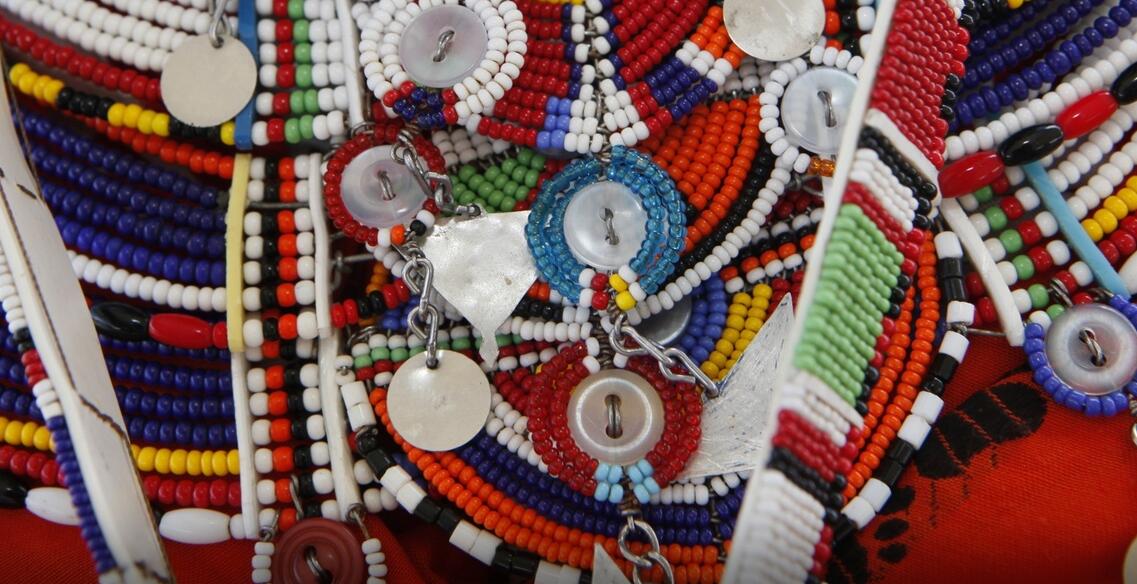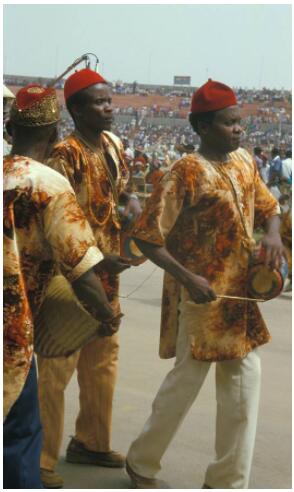Algeria Population and Language
Most of the people of Algeria are of Berber origin, but a majority identify themselves as Arabs. The Berbers, however, constitute a large minority who often find themselves discriminated against. The population has grown sharply since independence in 1962. The rate of growth has now slowed down, but Algeria is still around a million more a year. Just over a quarter of Algerians are under 15 years of age.
While over 90 percent of the residents live on or near the coast in the north, large parts of the deserts in the south are almost empty. Extensive migration from the countryside has created overcrowded cities.
The Arab majority dominates culturally and politically. However, it includes groups of people with the most varied living conditions, from desert nomads to the plains of the plains of the countryside and the residents of the coast.
- COUNTRYAAH.COM: Key populations estimated size and data of Algeria, including population density of how many people per square mile. Also included are facts for population and language.
The Berbers are the country’s indigenous people. According to various calculations, those who now consider themselves berber constitute between one fifth and up to one third of the population. The largest Berber people are the Kabals and Shawi Berbers, who live mainly in the mountains east of Algiers and south of Constantine. Many cabals live in Algiers. Among the lesser Berber people are the Tuaregs in the south and the Mozabites in northern Sahara.
The Berbers have long fought for the central power’s Arabization of the country and for the right to preserve its own culture and use its own language, tamazight (actually a collective name for several different Berber dialects). Sometimes the fight has become violent (see Modern History). In isolated mountain and desert regions, the Berber has been able to maintain its distinctive character. Since 1995, tamazight has been used as a teaching language in the schools in the Kabylia in the northeast. Tamazight gained status as a national language in 2002 and as an official language in 2016.
Arabic, which was previously the official language, is spoken by most Algerians. The spoken Arabic is very different from the standard Arabic used in writing throughout the Arab world. In Algerian Arabic there are elements of French, Spanish and Berber. French was banned in 1998 as a written language in the state administration and as a spoken language in, for example, public political speeches. But the French are traditionally scattered in the business and education sectors. There is a contradiction between French-friendly modernists and Islamists who have wanted to Arabize academic and public life. Islamists also oppose tamazight’s official language status.
There are three completely different alphabets – the Arabic, Arabic, and Latin characters used primarily in French.
FACTS – POPULATION AND LANGUAGE
Population
arabs about 80%, arabs about 20%
Number of residents
41 318 142 (2017)
Number of residents per square kilometer
17 (2017)
Percentage of residents in the cities
72.1 percent (2017)
Nativity/birth
23.1 per 1000 residents (2016)
Mortality/mortality
4.8 per 1000 residents (2016)
Population growth
1.7 percent (2017)
Fertility rate
2.8 number of births per woman (2016)
Percentage of women
49.5 percent (2017)
Life expectancy
76 years (2016)
Life expectancy for women
77 years (2016)
Life expectancy for men
75 years (2016)
Language
Arabic and Tamazight (Berber) are official languages, French is widely spoken
Lena is testing
2015
December
Basic amendments clear
President Bouteflika approves the constitutional changes that have been discussed in three directions since 2011.
October
TV channel is forced to close
Authorities shut down the privately owned channel El Watan since it sent an interview with Madani Mezrag, former leader of the Islamic Rescue Front (FIS) Armed Branch Islamic Rescue Army (AIS). In the interview, Mezrag talked about forming a political party and he criticized President Bouteflika. El Watan TV is based in London and broadcasts from Cyprus, but has around 170 employees in Algeria.
September
Intelligence Manager exchanged
Bouteflika replaces the influential intelligence chief General Mohamed Mediène, thereby further strengthening his grip on the security service. Mediène, dubbed Algeria’s “kingmaker”, did not support Bouteflika’s re-election in 2014 and is now being replaced after 25 years in the post of DRS chief, by former Deputy Chief Athmane Tartag.
August
Former intelligence chief arrested
Abdelkader Aït-Ouarabi, known as “General Hassan”, is arrested and held in a military prison. General Hassan was for a long time head of the intelligence service DRS and led the army’s fight against Islamist groups but was forced to retire in 2013. He is now charged with weapons possession, disobedience and for destroying military documents. This is the first time a former senior manager in the intelligence business is being brought to trial. He is sentenced in November to five years in prison.
July
Bouteflika replaces security officers
The president replaces the head of the counter-espionage DSI, the head of the president’s security force and the head of the Republican Guard. Bouteflika has gradually reformed the intelligence services and transferred much of the responsibility to the army chief.
Soldiers killed in Islamist deed
About ten soldiers are killed in an Aqim raid in Ain Defla Province in the northwest, in one of the bloodier attacks since the terrorist attack in In Amenas (see January 2013).
Clashes between Berber and Arabs
Around 25 people are killed and some 70 are injured in clashes between Arabs and Berbers in the area around the oasis town of Ghardaïa. Rioting has occurred since December 2013, due to rivalry over jobs, housing and land, but the outbreak of violence is the worst so far. About 30 people are arrested by the security forces the days after the collapse.
June
Ahmed Ouyahia again as party leader
The President’s Chief of Staff and the former Prime Minister will return as party leader of the RND (see January 2013).
Decreased oil revenues
Revenue from oil exports is reported to have fallen by 45 percent during the first five months of the year, which means that trade is in deficit. The reason is sharply falling oil prices.
May
Renovation in the government
The President replaces, among other things, the Minister of Energy. Popular protests of unprecedented scale have occurred during the year against drilling for shale gas in southern Algeria.
Opposition to Islamists
The military kills 25 militant Islamists in an area east of Algiers. A total of 59 Islamists were killed during the year.
New IS group
A jihadist – “brigade” who was previously loyal to al-Qaeda group Aqim is said to have joined the IS-allied group Jund al-Khilafa fi Ard al-Jaza’ir (“The Caliphate of Algerian Soldiers”).
Judge of the Sonatrach scandal
Fourteen people are sentenced to prison and seven foreign companies are fined, in the corruption scandal within the oil company Sonatrach (see also January 2010). The judges are addressing the construction of a 120-mile-long east-west highway through northern Algeria, a prestige project that began in 2006 but has not yet been completed. The cost has more than doubled during the journey.
April
Three suspected Islamists killed
The military also seizes weapons and ammunition at a strike 10 miles west of Algiers.
March
Violence against women in the home is criminalized
Abuse that leads to injuries should be able to provide up to 20 years in prison and the death toll. Some Islamists argue that the law risks “breaking up families” while, among others, Amnesty International criticizes the fact that the law allows for abusive victims to “pity” the perpetrator, which, they fear, could lead to strong pressure on vulnerable women.
February
“Power Vacuum”
According to former Prime Minister Ali Benflis, Algeria is in a power vacuum because of Bouteflika’s weak health. Whether government or parliament works, Benflis argues.
January
Terrorist acts are reportedly averted
The authorities say they have planned attacks on three oil and gas plants in the south. Security had tightened along the border for the two-year anniversary of the bloody assault in In Amenas (see January 2013).




